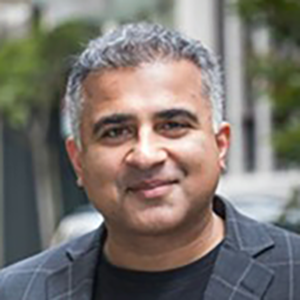Biography
Vik evaluates and pursues investments at the intersection of technology and life sciences, including in personalized and precision healthcare. Prior to joining Foresite Capital, Vik was the chief scientific officer of GRAIL, a life sciences company working to detect cancer early when it can be cured, and remains on its Scientific Advisory Board. He is also the co-founder and former chief scientific officer of Verily (formerly Google Life Sciences) and served as chair of its Scientific Advisory Board. A former academic principal investigator, Vik retains appointments as associate professor (consulting) at the Stanford School of Medicine, and as an affiliate scientist of the Lawrence Berkeley National Laboratory and the University of California, Berkeley, for which he serves on the advisory board of the College of Chemistry. He is an advisor to the Department of Defense through the Defense Science Board’s Task Force on Biology. Vik’s research interests lie at the interface of the physical sciences, engineering, and the life sciences. He and his collaborators have developed nanotechnology probes for the early detection and molecular imaging of disease, spectroscopic tools for imaging objects on the nanoscale, microfabricated and miniaturized analytical and imaging systems for point-of-care testing, methods and devices that dramatically enhance the sensitivity and specificity of MRI, and new tools for clinical bioinformatics and integrative systems biology. Aspects of this work have been commercialized through several startups. At GRAIL, Vik led laboratory and data science teams at the forefront of industrial cancer genomics and diagnostics development.
Session Abstract – PMWC 2020 Silicon Valley
Precision medicine has incredible promise for patients. Enormous amounts of money and time are invested in developing technologies and targeted therapies. Genomics, proteomics, phosphorylation assays, RNA expression, organoid growth, and testing, and even delicate mass measurement of liquid cancer cells are explored. This innovation must be focused to maximize the benefit to the most important participants in our healthcare system, the patient. This track is about putting patient needs first, and understanding and accessing the latest (cancer) treatment options.
- Overview for Patients: The Latest Cancer Treatments
In this session, you will hear from industry leaders about the latest strategies for diagnosing and treating cancer, the latest targeted- and immunotherapies, and the latest techniques for catching cancer early when it is most vulnerable. These breakthroughs could save your life or that of a loved one.
- Jennifer Grandis, UCSF
- Cliff Hudis, ASCO
- Craig Lipset, Clinical Innovation Partners LLC
- Richard Wender, American Cancer Society - Overview for Patients: Latest Tech In Oncology
Oncologists are increasingly using technology to precisely diagnose the biological mechanisms driving a patient’s tumor, to predict which therapies are likely to be most effective in block-ing them, and to monitor the patient’s response in real time. Learn how these technologies are transforming the practice of oncology into a science.
- Vik Bajaj, Foresite Capital
- Matt De Silva, Notable Labs
- Gary Palmer, Tempus, Inc.
- Daniel Simon, Guardant Health
- Margaret McCusker, Flatiron Health - How Patients Get What They Need
The latest treatment options are not an option if you can’t get or afford them. Learn about the novel strategies top docs use to access breakthrough tests and therapies for their patients through clinical trials, expanded access and contingent reimbursement.
- Eric Marton, Wavemaker 360
- June Wasser, Consultant
- Martin Naley, OctX
- Conrad Vial, Sutter Health
- Maurie Markman, CTCA Health - Summary for Patients: So What- Putting It Together
For nearly a decade, non-profit Cancer Commons has helped thousands of patients and their physicians beat the odds with information about the latest tests and treatments. New software and industry partnerships are taking this to the next level, where treatment decisions are in-formed by the latest tech, a treatment’s accessibility, and the collective experience of all patients and physicians.
- Marty Tenenbaum, Cancer Commons
- Carla Grandori, SEngine Precision Medicine
- Mika Newton, xCures
- Conan Kinsey, Huntsman Cancer Center
- Jim Snyder, Henry Ford Health System
- Erika Monteverdi, Cancer Commons
- Harvey Cohen, Stanford University









